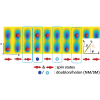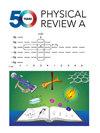Anisotropy-induced Coulomb phase and quasiparticle zoo in the atomic monopole-spin hybrid system
IF 2.9
2区 物理与天体物理
Q2 Physics and Astronomy
引用次数: 0
Abstract
Quantum simulation of a monopole-spin hybrid system is performed on the basis of a dipolar ultracold gas in a ladder lattice. The site-occupation states of the dipolar ladder lattice gas can spontaneously emulate both the monopole and spin excitations. The hopping of the atoms induces a particle conversion process between spin and monopole pairs, and the dipole-dipole interaction determines the spin-spin, spin-monopole, and monopole-monopole interactions. The anisotropic nature of the dipole-dipole interaction allows hereby for a flexible engineering of the designed hybrid system, and for a significant tunability of the interaction strengths. As a result, we encounter a rich phase diagram, and specifically a self-assembled Coulomb phase arises, in which monopoles and spins coexist and are orderly arranged according to the local Gauss's law. The Coulomb phase hosts a zoo of different types of quasiparticles and provides the possibility to simulate various phenomena in particle physics, such as a degenerate vacuum, particle decay, and conversion processes. Our work provides a significant extension of the scope of quantum simulations based on the anisotropy of dipolar interactions.

原子单极-自旋混合系统中各向异性诱导的库仑相和准粒子动物园
以梯形晶格中的双极超冷气体为基础,对单极-自旋混合系统进行了量子模拟。双极性梯形晶格气体的位占态可以自发地模拟单极和自旋激发。原子的跳跃诱导了自旋和单极对之间的粒子转换过程,偶极-偶极相互作用决定了自旋-自旋、自旋-单极和单极-单极相互作用。偶极-偶极相互作用的各向异性使我们可以灵活地设计混合系统,并对相互作用的强度进行显著的调整。因此,我们看到了丰富的相图,特别是出现了自组装库仑相,其中单极和自旋共存,并根据局部高斯定律有序排列。库仑相容纳了不同类型的准粒子动物园,为模拟粒子物理学中的各种现象提供了可能,如退化真空、粒子衰变和转换过程。我们的工作极大地扩展了基于偶极相互作用各向异性的量子模拟范围。
本文章由计算机程序翻译,如有差异,请以英文原文为准。
求助全文
约1分钟内获得全文
求助全文
来源期刊

Physical Review A
物理-光学
CiteScore
5.40
自引率
24.10%
发文量
0
审稿时长
2.2 months
期刊介绍:
Physical Review A (PRA) publishes important developments in the rapidly evolving areas of atomic, molecular, and optical (AMO) physics, quantum information, and related fundamental concepts.
PRA covers atomic, molecular, and optical physics, foundations of quantum mechanics, and quantum information, including:
-Fundamental concepts
-Quantum information
-Atomic and molecular structure and dynamics; high-precision measurement
-Atomic and molecular collisions and interactions
-Atomic and molecular processes in external fields, including interactions with strong fields and short pulses
-Matter waves and collective properties of cold atoms and molecules
-Quantum optics, physics of lasers, nonlinear optics, and classical optics
 求助内容:
求助内容: 应助结果提醒方式:
应助结果提醒方式:


